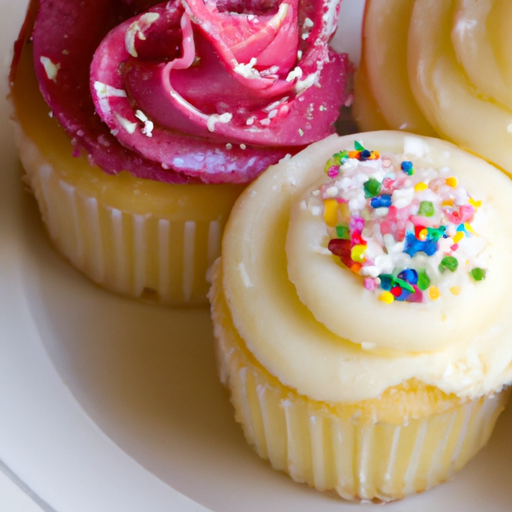The Irresistible World of Cupcakes
Cupcakes have become an essential part of our culinary world, delighting both young and old with their irresistible charm. These miniature treats are not only visually appealing but also burst with delectable flavors that make them simply irresistible. In this blog post, we will explore the wonderful world of cupcakes, from their taste and common uses in cooking to their nutritional value and intriguing history.
Taste that Takes You to Cloud Nine
Cupcakes are moist, tender, and come in a wide range of flavors that cater to every taste bud. From the classic vanilla and chocolate to more unconventional combinations like salted caramel and matcha green tea, there is a cupcake flavor to satisfy every craving. The pleasure that comes from biting into a cupcake is inexplicable — the softness of the cake, the silky smoothness of the frosting, and the rich, decadent flavor all come together to create an exceptional tasting experience.
Versatility that Inspires Creativity
Cupcakes offer endless possibilities in the realm of culinary creativity. While they are often associated with birthday parties and other festive occasions, cupcakes have found their way onto everyday menus, high-end dessert tables, and even weddings. Their individual portion size and portable nature make them perfect for sharing or indulging in a guilt-free solo treat. Whether you want to experiment with unconventional flavors, create thematic decorations, or develop innovative fillings, cupcakes are a canvas that empowers aspiring bakers and pastry chefs to embrace their imaginations.
Nutrition Hidden in a Sweet Disguise
While cupcakes may be a delightful indulgence, it’s important to consider their nutritional value. Cupcakes are typically high in calories, as they contain generous amounts of sugar and fats. However, they can be enjoyed as an occasional treat or part of a balanced diet. By using alternative ingredients such as whole wheat flour, natural sweeteners like honey or maple syrup, and incorporating fruits or vegetables into the batter, cupcakes can offer a healthier twist without compromising on taste. Moderation is key when savoring these delectable treats and finding a balance between enjoyment and nutrition.
A Slice of Cupcake History
Do you know where these delightful treats originated? The concept of cupcakes can be traced back to the 18th century, where they were first mentioned in American cookbooks. Originally, they were called “number cakes” due to their simple recipe measurements, consisting of one cup of butter, two cups of sugar, three cups of flour, and four eggs. The evolution of cupcakes accelerated in the early 21st century, thanks to reality baking shows and gourmet bakeries that pushed the boundaries of flavor and design. Today, cupcakes have become a global phenomenon, inspiring dedicated boutiques and international competitions.
Fun Cupcake Facts
- The world’s largest cupcake weighed over 1,200 pounds and was baked in 2011.
- The first National Cupcake Day in the United States was celebrated on December 15, 2010.
- The term “cupcake” was coined in the late 19th century, referring to the fact that the ingredients were measured by cups.
- The record for eating the most cupcakes in one minute stands at 29 cupcakes. That’s quite a feat!
Cupcakes have earned their place in the hearts of dessert enthusiasts worldwide. From the moment you take your first bite, you’ll understand why these miniature treats hold such appeal. Their taste, versatility, and nostalgic charm continue to inspire bakers and brighten up celebrations.
So, next time you find yourself craving something sweet, don’t resist the temptation to indulge in a cupcake. These delightful creations are not just desserts; they are edible works of art that bring joy to every occasion.
Cupcakes
Cupcakes are small, single-serve cakes that are baked in muffin-style cups and are often topped with frosting or other decorations. Here are some interesting facts about cupcakes:
Origin and History:
- The concept of cupcakes dates back to the 18th century. Initially, they were known as “number cakes” or “1-2-3-4 cakes” because the recipe was based on easy-to-remember proportions of ingredients.
- Cupcakes gained popularity in America during the 19th century when measuring ingredients became more standardized, thanks to the availability of measuring cups.
- The name “cupcake” is believed to have come from the way the ingredients were measured – with a cup.
- In the early days, cupcakes were often baked in small pottery or metal molds. Liners became popular in the 20th century, making it easier to remove the cupcakes from the pans.
Common Uses:
- Cupcakes are often served as a dessert at parties, birthdays, and special occasions. They are also popular for afternoon tea or coffee breaks.
- Cupcake flavors can vary widely, ranging from classic vanilla and chocolate to more adventurous flavors like red velvet, lemon, or matcha.
- Cupcakes can be decorated in numerous ways, including piped frosting, sprinkles, edible glitter, edible flowers, or themed decorations.
Nutritional Benefits:
- Cupcakes are generally known for their taste and indulgent nature rather than being a health food.
- The nutritional profile of a cupcake can vary depending on the recipe and ingredients used. Commonly, cupcakes are high in calories, sugar, and fat and should be enjoyed in moderation as a treat.
Unique Properties and Significance:
- Cupcakes have become a popular subject for baking competitions, with events like cupcake challenges and cupcake wars highlighting creative flavors and decorative techniques.
- Mini or bite-sized cupcakes, also known as “fairy cakes” or “petit fours,” are a smaller variation of cupcakes and are often served at elegant parties, weddings, or afternoon teas.
Overall, cupcakes have a rich history and offer a delightful treat for various celebrations and sweet cravings.




Use the share button below if you liked it.
It makes me smile, when I see it.